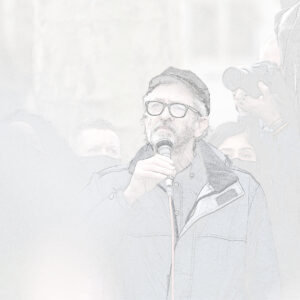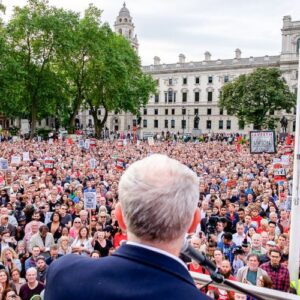Source >> +972 Magazine
This article originally appeared in “The Landline,” +972’s weekly newsletter. Subscribe here.
The horrifying sight of settler pogroms last week, in which hundreds of Israelis rampaged through Palestinian villages in the occupied West Bank after a deadly shooting in the settlement of Eli, has pushed Israel’s security authorities into a very uncomfortable corner. Embarrassed by the viral images of burning homes, charred vehicles, and destroyed businesses, the army, police, and Shin Bet jointly denounced the attacks as “nationalist terrorism” that “contradict every moral and Jewish value.” The IDF has been particularly eager to present itself as a responsible body that will restore law and order, promising to take every measure against those “who act in a violent and extreme manner inside the Palestinian towns.”
Putting aside the glaring fact that the army is one of the principal institutions providing settlers with the resources, protection, and confidence to carry out such wanton violence, there is another reason why this public relations manoeuvre should be called out for the farce that it is.
On June 19, just days before the pogroms, an Israeli Apache helicopter fired missiles into the West Bank city of Jenin during a fierce battle between raiding army units and Palestinian fighters, purportedly to “provide cover” for evacuating wounded soldiers; five Palestinians including a 15-year-old boy were killed, and 90 were injured. Two days later, an Israeli drone fired at a Palestinian militant cell near Jenin, said to target gunmen responsible for several attacks including at a checkpoint. Both operations were quickly overshadowed in the ensuing days by the Eli shooting and the settler violence that followed.
Far from being one-off incidents, the aerial assaults reveal a dangerous phase in the evolution of Israel’s occupation. The air strikes are reportedly the first in the West Bank in two decades, awakening the nightmares of many Palestinians who ran for cover or suffered wounds from helicopter attacks during the Second Intifada. In that time, though, aerial warfare became the modus operandi in the Gaza Strip, accelerated by Israel’s withdrawal of its settlements in 2005 and the total blockade of the territory following Hamas’ takeover.
This reconfiguration of military rule has intentionally produced a physical and psychological separation between the West Bank and Gaza, abetted by the fratricidal rivalry between Fatah and Hamas. As that distance normalized, the two territories became regarded as disconnected and incomparable. Even well-meaning advocates — in their heavy focus on settlements and annexation — often fell into the trap of forgetting Gaza outside the scope of wartime, deeming it an anomaly in the context of the “one-state reality.” But as many activists, scholars, and experts have warned, the structures used to confine and suppress Gaza are not a deviation from Israel’s methodology, but a natural continuation of it. And that was made clear over the skies of Jenin last week.
Like Gaza, Jenin has long been a centre of Palestinian social life and political resistance — and as such, a target of vicious repression. For over a year, the Israeli army has carried out a deadly and protracted operation in the city, repeatedly closing off the region while ground troops break into civilian homes and destroy public infrastructure on a near-weekly basis. The Palestinian armed groups, led by young men who have only known a life of despair and death, have put up a relentless fight, and have recently shown that they can make it even more difficult for Israeli troops to invade — a fact that forced the army to desperately turn to air power last week. The bombardment of a populated urban area, together with the city’s collective punishment, is further justified by the demonization of Jenin as a “cesspool of terrorism” requiring constant intervention — in essence, the same doctrine of “mowing the lawn” that is applied in the blockaded strip a few kilometres away.
As such, Gaza is hardly an exception to the rule of Israeli apartheid. Rather, it is the ultimate bantustan — the model for controlling and weakening a native population in a besieged space, using modern weapons and technology, with local rulers to handle their basic needs, at minimal cost to the settler society surrounding them. West Bank centres like Jenin and Nablus, already subjected to various forms of closure and invasion, are now catching a glimpse of what is yet to come. For many people there, the main experience of Israelis may no longer be of raiding troops or marauding settlers, but of soaring jets and humming drones. If the expulsion of Palestinians won’t be possible, Gazafication will be their future.
That is why it is a morbid joke to hear IDF Chief of Staff Herzl Halevi, days after the settler pogroms, preaching at an army commencement ceremony: “An officer who sees an Israeli citizen, intending to throw a Molotov cocktail at a Palestinian house and stands idly by, cannot be an officer.” The army may feign distress over settlers committing “nationalist terrorism,” but it openly commands its soldiers to do the same, so long as it is done in uniform. Either way, despite Halevi’s claim, it is clear that an Israeli who oversees brutal violence in Gaza can easily find a path to becoming a general-turned-politician. An Israeli inciting the same violence in the West Bank, meanwhile, can now aspire to become minister of national security.
Art (55) Book Review (127) Books (114) Capitalism (68) China (81) Climate Emergency (99) Conservative Government (90) Conservative Party (45) COVID-19 (46) EcoSocialism (60) Elections (85) Europe (46) Fascism (64) Film (48) Film Review (69) France (72) Gaza (63) Imperialism (101) Israel (130) Italy (46) Keir Starmer (57) Labour Party (116) Long Read (42) Marxism (49) Marxist Theory (47) Palestine (186) pandemic (78) Protest (154) Russia (345) Solidarity (153) Statement (50) Trade Unionism (144) Ukraine (351) United States of America (140) War (371)
The Anti*Capitalist Resistance Editorial Board may not always agree with all of the content we repost but feel it is important to give left voices a platform and develop a space for comradely debate and disagreement.
Latest Articles
- Your Party’s New Leadership – The CEC Election And The Likely FalloutWhat are the possible consequences of Your Party’s recent CEC elections, Joseph Healy looks at this in the current political context.
- Earthquake in Gorton, tremors in Downing st.Dave Kellaway makes an initial analysis of the Green victory in Gorton and Denton
- Your Party and the return of strategyThe CEC elections are over. Your Party needs a clear vision and action to coordinate the resistance to capitalism, climate collapse, and the far right, argues Simon Hannah.
- SEND reforms: Built to Fail?How far can the proposed SEND reforms overcome the conditions the system operates in, asks Simon Pearson
- Socialist Strategy: Minneapolis shows the wayThe victory of the people of Minneapolis against ICE and Trump is something we can be inspired by and learn from, writes Simon Hannah






